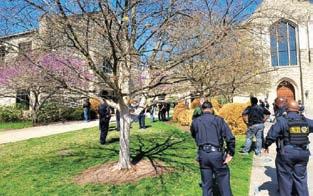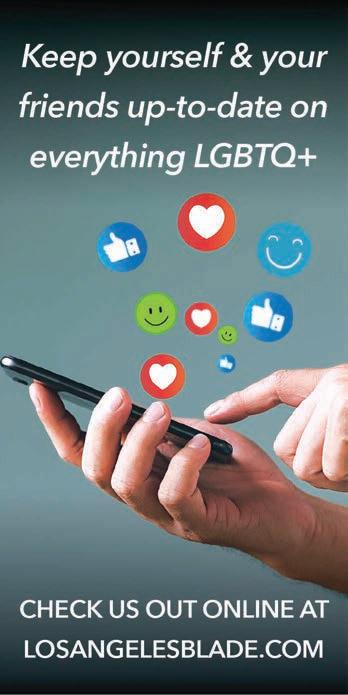












































April 17, 1965 was a typical spring day in the nation’s capital. What was very much atypical however, was the presence of more than a dozen men and women, dressed in professional business attire, marching in a circle on the wide expanse of the sidewalk in front of the North facade of the White House holding protest signs that demanded equal rights for gays and lesbians.
Occurring a full four years before that hot muggy Greenwich Village night when all hell broke loose at the mafia-owned Stonewall Inn, thrusting the fight for gay and lesbian rights suddenly into the public spotlight by the mainstream media, a core group of dedicated gay rights activists was already engaged in pushing the message that homosexuals should have the same rights as every other American.
Frank Kameny, Elijah ‘Lige’ Clarke, Jack Nichols, Barbara Gittings, Kay Tobin Lahusen, Paul Kuntzler, Lilli Vincenz formed a dynamic group, part of Washington, D.C. chapter of the Mattachine Society (MSW) that Kameny and Nichols had co-founded on Nov. 15, 1961.
Beyond the messaging of that April protest at the White House, later including the first Fourth of July picket in 1965 in front of Independence Hall, co-organized with Craig Rodwell who was active in the Mattachine Society in New York City, four of them would go on to be pioneers in the nascent gay press.
The protests at Independence Hall would continue until 1969.
Nichols, Clarke, Gittings and Lahusen would create some of the earliest gay themed content, stories and columns in early gay national publications. Nichols with his partner Clarke, wrote the column “The Homosexual Citizen” for Screw magazine, a pornographic ‘straight’ tabloid publication in 1968.
Gittings and Lahusen were engaged in early gay journalism. Lahusen’s photographs of lesbians appeared on the cover of The Ladder as Gittings worked as its editor. The Ladder, published by the Daughters of Bilitis (DOB), was the first national lesbian magazine.
In the summer of 1969, Nichols, Clarke, Gittings and Lahusen would create GAY, the first weekly newspaper for gay people in the United States distributed on newsstands underwritten by Screw magazine’s publisher and founder, Al Goldstein.
There was also her partnering with Kameny, as they waged a multi-year campaign pushing the American Psychiatric Association to declassify homosexuality as a mental illness.
In the August 1964 issue of The Ladder, Gittings’ editorial blasted a medical report that described homosexuality as a disease, writing that it treated lesbians like her more as “curious specimens” than as humans.
In 1971, some seven years later at the annual meeting of the APA, Gittings, Kameny and fellow gay activists stormed the meeting and Kameny seized the microphone, demanding to be heard. In a write-up celebrating that first Fourth of July picket in 1965 in front of Independence Hall 50 years later in 2015, the author noted:
“For the APA’s annual meeting in 1972, Kameny and Gittings
organized a panel on homosexuality. When no gay psychiatrist would serve on it openly for fear of losing his medical license and patients, Gittings recruited Dr. H. Anonymous (John E. Fryer, M.D.), who appeared masked and using a voice modulator. Gittings, Kameny and Dr. Anonymous asserted that the disease was not homosexuality, but toxic homophobia. Consequently, the APA formed a committee to determine whether there was scientific evidence to support their conclusion.
In 1973, with Gittings and Kameny present by invitation, the APA announced its removal of the classification. Kameny described it as the day “we were cured en masse by the psychiatrists.” At the time, the “cures” for homosexuality included electric shock therapy, institutionalization and lobotomy. With the APA’s retraction, the gay rights movement was no longer encumbered by the label and its consequences.”
Since her days as editor of the Ladder and assisting Kameny, Nichols, and Lilli Vincenz creating content and writing stories for the MSW newsletter, Gittings continued to write about lesbians, the movement, and the never ending fight to be recognized as citizens with full civil rights.
Gittings also successfully crusaded to promote gay literature and eliminate discrimination in the nation’s libraries.
The author of the chronicling of the 50 year celebration of that July 1965 protest writes: “She volunteered with the Gay Task Force of the American Library Association, the first gay caucus in a professional organization. Although she was not a librarian, she soon became the group’s coordinator—a position she held for 16 years. Gittings edited the Task Force’s bibliography and wrote “Gays in Library Land,” a history of the group. The American Library Association awarded her a lifetime membership.”
Looking back now, nearly 60 years after her editorial blasting medical reports that described homosexuality as a disease, the landscape of now LGBTQ media while dramatically different primarily due to the internet and digital journalism, the same fundamental needs to cover the unique stories of the LGBTQ community, and with the contemporary attacks on the transgender community are just as great as when Nichols, Clarke, Lahusen and she toiled away in that cramped office space in New York City publishing ‘Gay.’
Today’s Gen Z, Millennials and Gen Xers are the beneficiaries of Gittings’ and the early LGBTQ media pioneers’ work. The world they reside in, while still fraught with incredible undertones of homophobia and blatant transphobic bigotry, have a sense of freedom built on the foundations of journalism Gittings and her colleagues were devoted to.
Gay activist Michael Bedwell in a March 9, 2020 post wrote: “Kay Tobin Lahusen called me yesterday to alert me to Barbara’s inclusion in “TIME” magazine’s 100 Women of the Year project. They commissioned 89 new “TIME” mock covers to commemorate 89 women who should have been on the magazine’s covers over its near century of existence. The remaining 11 are existing real covers of women who had been named Person of the Year.
Gittings ‘cover’ used a 1964 photo by Kay rendered by Ser-
bian artist Ivana Besevic, and incorporates the motto “Gay Is Good” coined in 1968 by Barbara & Kay’s close friend and mentor Frank Kameny, the father of the modern gay rights movement. The accompanying text by Time’s San Francisco Bureau Chief Katy Steinmetz reads:
“The Stonewall riots have become the focal point of the modern LGBTQ rights movement, but they didn’t start it. The groundwork was laid in the previous decade by activists like Barbara Gittings, who understood that before marginalized people can prevail, they must understand that they are worthy and that they are not alone.
In an era when it was dangerous to be out, Gittings edited the Ladder, a periodical published by the nation’s first known lesbian-rights organization, the Daughters of Bilitis, creating a sense of national identity and providing a platform for resistance. In the August 1964 issue, her editorial blasted a medical report that described homosexuality as a disease, writing that it treated lesbians like her more as “curious specimens” than as humans.
Gittings would go on to be instrumental in getting the American Psychiatric Association to stop classifying homosexuality as a mental illness and in getting libraries to carry gay literature. Whether she was wielding a pen or a protest sign, the militant advocate had a simple message: when society said that being gay was an abomination, Gittings said that gay was good.
The journalistic legacy Gittings left for those of us who work in LGBTQ media is unchanged from her days: Tell the stories of LGBTQ people and in light of today’s campaign by far-right conservatives and others to ban our books, marginalize our LGBTQ kids, and erase our trans siblings and remind everyone when society claims that being LGBTQ is an abomination, that no, actually, “gay IS good.”
For the Los Angeles Blade and the Washington Blade, GLAAD’s 2023 prestigious Barbara Gittings Award for Excellence in LGBTQ Media is not only an honor, but a commitment to continue her legacy.


A beacon of hope for underserved vulnerable communities of LGBTQ+ adults in LA can be found in a non-descript almost fortress looking concrete high-rise office building located at 3055 Wilshire overlooking Koreatown.
The offices of the Asian Pacific AIDS Intervention Team (APAIT), whose stated mission is to positively impact the quality of life for those medically underserved communities, is a labyrinth of meeting and counseling rooms, art therapy spaces, offices, and a large, private, outdoor patio for events. The walls are lined with posters of inspirational banners like “Heroes Work Here,” as well as breakdowns of case studies on sex trafficking, mental health, and addiction.
With the Koreatown location plus offices in Orange County, APAIT‘s work focuses on the quality of life for vulnerable people experiencing behavioral health challenges, housing insecurity, and who are at-risk for HIV AIDS.
“I know the lingo everyone uses is BIPOC,” Jury Candelario, a licensed clinical social worker and the Executive Director told The Blade.
“But for us, we say communities of color. Even in our staffing, we try to re ect our consumers. This is how we roll. This is our mission and we have to re ect the community that we serve.”
Candelario explained that APAIT started thirty-five years ago with a focus on the HIV AIDS crisis.
“We started out really grounded in the work of HIV AIDS primarily addressing grief counseling for gay Asian men,” said Candelario. “Many of these men died alone from HIV AIDS because most of their families didn’t even know they were gay let alone they were dying from the disease.”
Overtime, APAIT expanded their services not just to HIV AIDS, but to a broader range of sexual health issues. APAIT deals with a range of issues not just impacting gay men but those that impact the larger queer community.

“The core pillars of APAIT services are sexual health, behavioral health, housing, forensic treatment, which is basically for folks who are coming out of jails in prison, and human trafficking,” Candelario emphasized.
Even with four different offices and seven different housing sites, the organization often has to outsource resources due to the high need for their services. Jazzmun Nichcala Crayton, Associate Director, told the Blade that the American socio-economic system is in large part to blame.
“They say the system is broken,” said Crayton, “but no one really knows how to navigate the system. Plus, the system was never designed with people of color in mind, so you are asking us to perform at a level and to perform in ways that we were never trained or designed or had the opportunity to. We were never given access to that information.”
Crayton explained that the system often produces broken homes, especially within atrisk communities of color, leading to a cycle that can often feel impossible to break.
“If your mother was in survival mode, and she was a single parent, and you are coming up through that system and that way of life, the only way you’re going to break the chain is to break the chain yourself. It is very difficult for a child to make that shift. Already they are familiar with poverty, they are familiar with not having. That’s not the story for everybody, but that’s the story for a lot of people. You see it a lot,” Crayton noted.
“If you don’t have all those dynamics like a mother and father, making a certain amount of money to provide for a family, that causes a lot of problems. A lot of times, you see Caucasian counterparts where the mother does not work, and she gets to stay home and be the caregiver and nurture the children. But even that is changing in our society. More and more often, the parents are out of the home. Children end up raising themselves and end up fending for themselves because everyone is trying to make money so that they can live a certain way.”
“But can you imagine people of color with more than one child Often, especially in Black families, the father is absent for whatever reason, so the mother is the matriarch, running the entire household, trying to work and go to school and provide for children.”
“People use this term ‘strong Black woman,’ but Black women don’t want to be strong all the time. Women don’t want to be strong all the time,” she added.
According to a pre-COIVD survey by the Williams Institute at the UCLA School of Law on Victimization ates and Traits of Sexual and Gender Minorities (SGMs) in the United States, SGMs are at greater risk of experiencing violent crime than their white cisgender heterosexual counterparts.
The Williams study showed that LGBTQ+ people were nearly four times more likely than non LGBT people to experience violent crime. The odds of experiencing a violent victimization were higher for SGMs than non-SGMs .
SGM persons experienced more criminal victimization than non-SGM persons. SGMs experienced 71.1 violent victimizations per 1,000, compared to 19.2 per 1,000 among nonSGM persons.
SGMs had a higher rate of serious violence, defined as rape or sexual assault, robbery, or aggravated assault, than non-SGMs, including higher rates of violence involving a weapon and violence resulting in serious injuries.
“There have been increased attacks in the Asian community,” acknowledged Candelario. “Unfortunately, I would say hatred got bigger with COVID-19 and how it was blamed essentially on the Chinese community by the last administration. It coronavirus was called ‘the China u,’ so there’s definitely a lot of that in uence in that.”
APAIT offers self-defense classes as part of their program to help women who find themselves the victims of attacks. The staff are also encouraged to take these classes. As Candelario pointed out, “No one is safe. We are all at risk.”
While the rise in hate crimes has propelled the self-defense program, the classes initially started after a group of trans women were conducting a makeup class for gender representation at APAIT. The class itself was broken into and robbed, leaving the women defenseless and scared.
When asked why queer people of color are so often particularly affected in statistics like those from the UCLA study, Crayton said that she blames the social dehumanization of queer people within society.
“We get dehumanized on a daily basis,” said Crayton. “Our humanity is laughed at. It is ridiculed. There are policies in place all over America to prevent us from even trying. We don’t even get a chance to try as a whole.”
“We are very special here in California. We have different dynamics, but some of our siblings in other states are limited by the law. They can’t do a Drag show anymore in Tennessee. I mean, what is that Why is that important Our purpose is to educate to bring these people up so that they can go out in the community and provide for themselves.”
Candelario added that words like “faggot” and “groomer” which are deeply ingrained in right-wing rhetoric, help to propel this dehumanization and so should be eradicated.
“I think we have to watch trauma informed language,” said Candelario. “The words that we use impact how people are perceived.”
CONTINUES ON PAGE 06




CONTINUED FROM PAGE 04
One of the main functions of APAIT dealing with sex trafficking is not limited solely to members of the LGBTQ community. The organization often serves cisgender women in an industry that is notorious for acting as a sex trafficking cover.
“About two decades ago, we got into working with massage parlor industry,” said Cadelario.
According to a 2019 survey by APAIT, women often chose illicit massage parlor work from a very small number of employment options. Some women described being coerced or deceived into this work, but most women said that they chose this work as their best alternative.
Among limited options on the positive side, the pay was higher than in other industries, and could provide opportunities for self-employment. On the negative side, they were at risk for physical abuse, HIV and other STI’s, and mental health problems such as isolation arising from stigma. The risk of violence from clients and owners and robbery in this cash-based industry and possible arrest fines and jail were also threats, as was deportation in the case of undocumented immigrants.
Fear of arrest stops many women from coming forward. Fear of arrest almost always superseded fear of robbery or assault in a pre-Covid study. Many women were reluctant to seek police protection. Women who did not read or speak English were often unaware of what was happening after their arrest, leaving them vulnerable to predatory laws or those posing as lawyers, both in their criminal proceeding as well as their immigration cases.
Nan Ding, the Senior Clinical Program Manager runs the APAIT pilot related to sex trafficking alongside Candelario. She is a also a licensed clinical social worker.
“It started out with a court order program,” she explained. “This is mainly for people who work in massage parlor work, who were given a citation for suspicion of prostitution.”
This citation is part of what is known as a diversion program. Pretrial diversion programs in the state of California allow defendants who are eligible to avoid serving jail time as long as they complete treatment and education courses.
“We provide sexual health education and resources and mental health,” Ding told the Blade.
English lessons are also crucial to rehabilitating these women.
“Given the demographic of people who come to us through this program, many of them do not have the ability to speak English. All of them are immigrants, so we connect them to one of our social services which help them to live sustainably on their own.”
While some success stories do exist, Ding explained that it can often be years before these women are properly rehabilitated.
“To be honest with you, it has been quite challenging,” said Ding. “Because they don’t have degrees and they don’t speak English. We encourage a lot of them to go through cosmetic training so that it’s less risky for them, and it brings better income for them. A lot of them end up doing administrative work. One of my clients is now working at an acupuncture clinic at the front desk.”
Ding said that many of these women come here under false pretenses in hopes of a better life, only to be duped and stuck as pawns in sex trafficking rings.
Ding gave an example of one client in particular: “She went through trafficking in Taiwan through here she tried to escape. She came here, thinking she was going to be put her through nursing school to be an RN but the moment she landed here she was sent to be a sex worker.”
“This happens more often than you think,” said Candelario. “The sad part is this is a whole international syndicate of illegal organizations that run this human trafficking. We are definitely not saying all massage parlors are, but many are fronts for human trafficking
not just human trafficking in the sense of sex work and or labor trafficking. A lot of these people are recruited under the pretense that they are going to have work or schooling here. They prepare all their paperwork and documentation to get here legitimately, but once they land here, those documents are still with the syndicates not with those folks who were brought here. Essentially, they are trapped.”
“They are trapped once they get here. They don’t have any other recourse because this is their livelihood now. This isn’t just isolated in Asian communities it’s happening in central American communities too. It’s everywhere. Eastern European communities as well. Unfortunately, we also see these horrible stories of fourteen and fifteen-year-old children, young girls, being kidnapped here as well. Colored communities and foreign communities are vulnerable too as are communities without privilege and opportunities and education. The people who brought you here are the people you are supposed to be trusting for this ‘American dream,’ which ends up being an American nightmare,” she added.
Candelario also made it clear that APAIT does not condemn sex work as a legitimate form of employment. The problem lies in deceit and forced labor.
Those seeking help come to APAIT through a variety of ways. Many are found by APAIT on the streets through their grassroots program “Midnight Stroll.”
The Midnight Stroll and After Hours Caf was launched by the Asian Pacific AIDS Intervention Team in January 2017 in collaboration with the Los Angeles Transgender Advisory Council and The Wall Las Memorias Project, along with support from then LA Councilman Mitch O’Farrell, the Los Angeles Police Department and several community partners.
Under the program, volunteer outreach workers walk along Santa Monica Boulevard, from Vermont Avenue to La Brea Avenue, to provide water, food, and clothing vouchers, while also promoting HIV testing and other services. The program also provides some emergency shelter beds.

“When I started,” said Candelario, “I remember doing this kind of outreach and grassroots work. At the time, our main focus was ending the crystal meth epidemic. We were health educators, promoting health reduction systems to reduce crystal meth use. It’s about meeting the clients where they are.”
Many clients come to APAIT when they have nowhere else to turn.
“We had a client come in off the street with a sheet on her head and dirt on her face,” said Crayton. “She came from Alabama. She was ostracized and criminalized for being trans there. She had been kicked out of her home. She made her way up to California, which was complicated because she had no support system. She came here just hoping that the community would be able to guide and support her.”
“When she came to us, she had nowhere to go and she didn’t want to sleep between the buildings anymore. We were able to house her through a private organization immediately in South Los Angeles. Mr. Jury was generous enough to pay for her to stay there where she developed under our care.”
“She kept coming back to the office and participating in our programs. She had access mental health with her behavioral health counselor. She actually started interning somewhere at some point and from there she did so well she was able to obtain and sustain her own apartment. Because we were able as an organization to come together and surround this particular client with support and guidance and love, she was able to stand on her own two feet.”
“Now she is providing services for the community. She is going the kind of work that we are doing, and she is back in school studying to be a therapist. She was even honored by Laverne Cox, who gave her an award saying that she was a pillar in the trans community coming from such extreme circumstances in life.”









Senator Scott Wiener (D-San Francisco) introduced SB 407, legislation to improve foster care conditions for LGBTQ youth. Nearly one third of foster youth identify as LGBTQ.

SB 407 ensures LGBTQ foster youth are raised in supportive environments by creating standard documentation for their needs, adding more follow-up from the Department of Social Services, and requiring LGBTQ youth’s needs be specifically considered in at-home assessments including clarifying that conduct that poses risk to the health and safety of LGBTQ youth is a valid reason to deny a family the right to host a foster youth.
“Every child deserves to be one hundred percent supported at home,” said Wiener. “SB 07 ensures that foster youth receive this essential support by specifically requiring LGBTQ acceptance be considered in the resource family approval ( FA) process, creating standard documentation for the assessment of LGBTQ youth needs, and ensuring more frequent follow-up. These youth are at high risk for homelessness, criminal justice involvement, and mental health issues, and we must do everything in our power to ensure they have a safe home in the state of California.”
According to the California Child Welfare Indicators Project, there are 53,371 youth in foster care in California as of October 1, 2022. Youth who identify as LGBTQ are overrepresented in foster care, with at least three studies estimating about 30 percent of youth in foster care identify as LGBTQ.
The degree of support for their identity an LGBTQ child receives at home is a strong predictor of their mental health outcomes. According to the Trevor Project, teens who perceived parental support regarding gender identity were 93 less likely to attempt suicide than youth who did not perceive parents as supportive.
Data collected since the onset of the COVID-19 pandemic show LGBTQ youth are facing a crisis of mental health. Forty-two percent of LGBTQ youth and 52 percent of trans youth—said they seriously considered suicide
in 2021. This crisis may be related to the recent surge of anti-LGBTQ hatred in many states in recent years, which most LGBTQ youth are exposed to online. This year alone, more than 20 bills have been introduced in states across the country.
their sexual orientation and/or gender identity.
SB 07 will strengthen the resource family approval ( FA) process for LGBTQ foster youth by:
Requiring explicit consideration of LGBTQ youth in home and environmental assessments
Creating standard documentation by the Department of Social Services for these assessments to include LGBTQ youth needs
Reviewing county-approved resource families to evaluate if they are meeting the needs of LGBTQ youth and investigating related incidents as needed;
Ensuring that resource families have the necessary skills, knowledge, and abilities to support LGBTQ youth and Clarifying existing law that conduct that poses risk to the health and safety of LGBTQ youth is a valid reason for denial of a resource family.
SB 407 is sponsored by Equality California and the California Alliance of Child and Family Services.
In 2019, California passed AB 175 (Gipson), which expanded the foster youth bill of rights to include rights to be referred to by the youth’s preferred name and pronoun and maintain privacy of the child’s sexual orientation and gender identity and expression. Under existing law, foster youth also have the right to have caregivers and child welfare personnel that have received instruction on cultural competency and best practices for providing care for LGBTQ youth in out-of-home care.
However, while the foster youth bill of rights is strong, it has not translated into the FA process or into considerations made when approving caregivers. LGBTQ foster youth are still being placed in homes with families that discriminate against or are hostile toward them based on
“According to the Trevor Project, teens who have parental support regarding their gender identity were 93 less likely to attempt suicide than youth who did not perceive parents as supportive. Supportive and affirming homes for LGBTQ+ foster youth saves lives. The CA Alliance is excited to partner with Senator Wiener on SB 407 to ensure that all LGBTQ foster youth have affirming families and feel safe, supported, and cared for.” Christine Stoner-Mertz, CEO of the California Alliance of Child and Family Services
“LGBTQ+ foster youth experience violence and other stressors unique to the LGBTQ+ community, including homophobia or transphobia,” said Tony Hoang, Executive Director of Equality California. “SB 07 protects LGBTQ foster youth from being placed in non-affirming homes by creating standard guidelines and criteria that carefully screens potential families. LGBTQ+ foster youth need a healthy environment that supports and embraces them as they explore their identity.”
FROM STAFF REPORTS
The Los Angeles LGBT Center will host Drag March LA on Easter Sunday, April 9, 2023. The event for all ages and aims to mobilize against the oppressive anti-LGBTQ+ tidal wave that is currently sweeping through America.
The march will start at West Hollywood City Hall, located at 8300 Santa Monica Boulevard, at the corner of Santa Monica Boulevard and Sweetzer Avenue and end at the LGBT Rainbow District.

There are already over 400 pieces of anti-LGBTQ+ legislation on the books—unsurprisingly, most of them target transgender people and drag performances too.
“Drag has always been political and gender has always been policed. LGBTQ+ people have always known (and shown) that there are many shades of the rainbow—and once again, it’s time for us to put them all on full display,” Los Angeles LGBT Center said in a statement. “We will not stand by while the far right seeks to roll back our rights.”
The event is in partnership with local LGBTQ+ organizations, faith groups, queer and trans activists, and the finest drag artists in the City of Angels.
10 a.m. Doors Open
11-11:40 a.m. ally Kickoff Performance
11:45 a.m. Demonstrators Get in Formation
12 p.m. March Begins
1 p.m. March Ends
Participants are encouraged to wear their best drag. Guest speakers will include the activists and families from impacted states who are fighting anti-LGBTQ legislation. See below for a full list of supporters.
+1,000 guests expected to attend. Stay tuned for more on speakers + performers!
Want to get your organization involved Sign up here Supporters of Drag March LA include the following:
Asian Americans Advancing Justice Southern California Bienestar Human Services
CA LGBTQ Health and Human Services Network
Equality California
LGBTQ Center Orange County
LGBTQ+ Community Center of the Desert ProjectQ
Racial & Ethnic Mental Health Disparities Coalition (REMHDCO)
Radiant Health Centers
Rainbow Services, Ltd.
Somos Familia Valle
The National LGBTQ Institute on Intimate Partner Violence
The Source LGBT+ Center
TransLatin Coalition



U.S. Rep. Maxwell Alejandro Frost (D-Fla.) during an exclusive interview with the Washington Blade on March 24 called for President Joe Biden to “speak out about” the wave of anti-LGBTQ legislation across the country.

The congressman said the U.S. Departments of Justice and Education “should be heavily involved in investigating what’s going on in Florida and in all these states where these bills are being passed.” Frost added that Biden is “the perfect person” to warn voters about the consequences of extreme anti-equality policies; noting the pro-worker, pro-union “Joe from Scranton” frequently promotes his working-class roots.
“That [message] coming out of his mouth, the story of these policies impact everyone, I think would have a really big impact,” the congressman said.
Frost, 26, in 2022 became the first Gen Zer elected to Congress.
He represents Florida’s 10th Congressional District that includes Pulse, a gay nightclub in which a gunman killed 49 people on June 12, 2016.
Frost co-organized the March for Our Lives, which took place in D.C. on March 2 , 2018, less than two months after a gunman killed 17 people in Marjory Stoneman Douglas High School in Parkland, Fla. His gun control advocacy efforts began when he became a volunteer for the Newtown Action Alliance, a group that formed in the wake of the massacre at Sandy Hook Elementary School in Newtown, Conn., in 2012.
Frost during the interview spoke out against Florida’s Parental Rights in Education Act — more commonly known as the “Don’t Say Gay” law — which he categorized as a “bigoted law made by bigoted people.”
The law aims to regulate classroom discussions about gender identity and sexual orientation from kindergarten through third grade. It also prohibits public schools from using confidentiality forms in the case of a student disclosing sensitive information that includes their gender identity and sexual orientation and requires personnel to inform their parents if they were to ask for the information.
“They’re starting to change our education system because they want to try to counteract the inherent progressive and, you know, decent values that young people have,” explained Frost.
While Republican Florida Gov. Ron DeSantis focuses on preparing legislation that otherwise helps “take away” history, Frost notes the governor does not put forth measures that seek to improve his state.
“He’s not focusing on raising wages, ensuring people have a livable planet, ensuring that we end gun violence, the rocketing housing prices,” Frost said. “And these things impact everybody.”
The congressman was weary of the overall repercussions that the “Don’t Say Gay” law would have on the mental and physical health of LGBTQ people across Florida, and he went as far as saying it could result in deaths. Frost further pointed out the number of hate crimes in his state has increased since DeSantis took office.
“This is going to have real impacts to LGBTQ+ students, pa-
rents, etc. Just people in the district and across Florida, that can result — that will result and is resulting in — trauma and people being hurt and hate crimes, and we probably will see death from it,” said Frost.
“This [governor] is a dictator,” he concluded.
State lawmakers and other members of Congress have introduced Florida-style ‘Don’t Say Gay’ laws.
epublican Louisiana Congresswoman Julia Letlow introduced a Parental Bill of Rights Act in March that looks “to ensure the rights of parents are honored and protected in the nation’s public schools.” Frost maintains, however, that these types of bills only serve to spread bigotry and hate “under the guise of parental rights.”
Frost perceives what he contends is the extremist overhaul of the country’s educational system as a “long-term plan” from Republican politicians. A plan that, in his view, goes back to the overturning of the landmark Roe v. Wade ruling.
White House spokesperson Robyn Patterson in a statement to the Blade said Biden “has been outspoken in his support of LGBTQI+ Americans and he’ll continue to speak out against vicious political attacks against them.”
Biden earlier this month during an interview with Kal Penn for “The Daily Show” described efforts to restrict the rights of transgender people in Florida and elsewhere as “close to sinful.”
Four LGBTQ advocacy groups earlier this month filed a federal lawsuit on behalf of four families with trans children who are challenging the Florida Boards of Medicine and Osteopathic Medicine’s ban on gender affirming healthcare for minors.
Patterson in her statement stressed Biden “is grateful for the leadership of Congressman Frost and other leaders who share his commitment to supporting LGBTQI+ Americans and speaking out against dangerous policies that seek to vilify our fellow Americans.”
Frost spoke with the Blade a day after Capitol Police arrested Manuel Oliver, whose son, Joaquin “Guac” Oliver, was killed in Marjory Stoneman Douglas High School massacre.
Officers arrested Manuel Oliver after he and his wife, Patricia Oliver, challenged U.S. Reps. Pat Fallon (R-Texas) and Andy Biggs (R-Ariz.) during a joint House Oversight and Judiciary Committee hearing on gun control.
The two epublican congressmen asked officers to remove the Olivers from the hearing.
Frost, a vocal gun control supporter who survived a gun violence incident in 2016, told the Blade the hearing was full of “lies.”
“Folks were in town and people came out [because of my recently introduced gun bill]; glad they came to the hearing. And
they sat through all of those lies,” Frost said. “And I think when you hear those lies, sometimes you just want to say something.”
The Oliver family spoke out against Fallon’s defense of guns, saying how guns were the very thing that took their son away. Fallon then insisted that they be taken out of the hearing.
Frost later said the “real story” was the fact that there were “two parents who lost their son who was in high school, because he was shot to death and died in a pool of his own blood.”
Frost, who’s vice chair of the House Gun Violence Prevention Task Force, recently introduced a gun control bill that, according to a press release, “would bring together those most impacted by gun violence with leaders across federal agencies to advance policy, collect and report data, expand state and local outreach, and maximize existing programs and services related to preventing gun violence.”
Frost introduced the bill alongside U.S. Sen. Chris Murphy (D-Conn.)
The congressman also spoke about Biden’s controversial Willow Project, an oil drilling venture that will take place in Alaska. Climate activists are among those who strongly oppose the plan.
“A lot of times in life, but also a lot in politics, you have to hold multiple truths,” Frost emphasized. “And there’s a lot of truths to hold at the same time. The president approving this project is directly against, I believe his values, but also [the] campaign promises that he had made.”
The Trump administration originally approved the Willow Project in 2020, and up to 600 million barrels of oil are located in the area in which the drilling will take place.
The Biden-Harris White House felt it could not do much since Houston-based ConocoPhillips has the existing and valid leases for the area.
Even so, Frost emphasized that although the current administration is in favor of drastically cutting emissions, it also recognizes the fact that “at least for the next decade or two we’ll need a reliance on oil and fossil fuels as we transition, which is another truth.” He did stress, nonetheless, that he does not “subscribe” to the idea that society needs “more capacity to scale back emissions over the next few decades.”
“And we’re also here to tell the administration that, you know, there’s a lot more that can be done, there’s more projects pending,” Frost said. “We’d love to see them do the right thing on that. So, we’re talking with the administration directly. We’re working with organizations, especially like youth organizations, that are really thinking through the climate crisis.”
Christopher Kane and Michael K. Lavers contributed to this article.































Bavarian Nordic is a fully integrated vaccines company committed to saving and improving lives by unlocking the power of the immune system.
Bavarian Nordic is a fully integrated vaccines company committed to saving and improving lives by unlocking the power of the immune system.
Founded in 1994, Bavarian Nordic is a pioneer in the development and manufacturing of live, non-replicating vaccines, and has a rapidly growing global footprint.
Founded in 1994, Bavarian Nordic is a pioneer in the development and manufacturing of live, non-replicating vaccines, and has a rapidly growing global footprint.

Our fast-moving pipeline of vaccine candidates demonstrates our commitment to the fight against existing and emerging diseases.
Additionally, we’re dedicated to increasing disease awareness and education for the prevention and treatment of the diseases we work to combat.
Our fast-moving pipeline of vaccine candidates demonstrates our commitment to the fight against existing and emerging diseases. Additionally, we’re dedicated to increasing disease awareness and education for the prevention and treatment of the diseases we work to combat.
For more information, please visit BNVaccines.com or Bavarian-Nordic.com US-RAB-2200004. February 2022
For more information, please visit BNVaccines.com or Bavarian-Nordic.com
In a press conference Nashville Police Chief John Drake told reporters that earlier Monday morning a 28-year-old local female armed with two “assault-type ri es and a handgun” was killed by responding officers.
“At one point she was a student at that school,” Drake told reporters hours after the shooting at the Covenant School. “But unsure what year […] but that’s what I’ve been told so far.”
The shooter was identified as Audrey Hale, 28, of Nashville, according to the chief. Initial reports that Hale identifies as transgender had not been confirmed as of Wednesday and the reported manifesto Hale left behind had not yet been released to the public.
According to Drake, three children and three adults were killed in the shooting at The Covenant School on Burton Hills Boulevard, a private Christian school.
Children’s Hospital Vanderbilt University Medical Center
U.S. House Republicans on Friday passed the Parents Bill of Rights Act, a proposal that would require public schools to share educational materials with parents and also contains provisions that would trigger the outing of LGBTQ students without their consent.
Critics say the legislation’s professed purpose, to equip parents with the information necessary for them to better engage with their children’s educators, is a pretext for its ultimate goals: For schools to censor out content addressing race, or materials containing LGBTQ characters or themes, while also discouraging LGBTQ students from being out at school.
The Congressional Equality Caucus noted the likelihood of that outcome in a statement Friday denouncing the bill, which the group’s chair, U.S. Rep. Mark Pocan (D-Wis.), called “dangerous” — pointing to its requirement for “schools to forcibly out transgender students, even if it puts those youth in harm’s way.”
“All children deserve access to a safe and affirming school environment,” Pocan said in the statement. “Transgender youth have enough challenges already due to harassment, bullying, and anti-transgender state laws,” he said, adding, “My colleagues who voted for this bill should be ashamed.”
House members voted 213-208 for passage of the Parents Bill of Rights, or House Resolution 5, with Republican U.S. Reps.
spokesperson John Howser told reporters “We can now confirm three children and two adults from the school shooting were transported to our Adult Emergency Department (the two adults) and (the three children) to the Pediatric Emergency Department at Monroe Carell Jr. Children’s Hospital,” Howser said adding “All five patients have been pronounced dead.”
Police identified the three slain students as Evelyn Dieckhaus, Hallie Scruggs, and William Kinney, all age nine.
The three faculty members killed were Cynthia Peak and Mike Hill, both 61, and school head Katherine Koonce, 60.

At his only scheduled public event at the White House, President Joe Biden called the shooting “sick” and renewed his call for Congress to ban assault weapons.
Drake noted that the shooter was killed on the school’s second oor by his officers acknowledging that the victims were
Andy Biggs (Ariz.), Ken Buck (Colo.), Matt Gaetz (Fla.), Mike Lawler (N.Y.) and Matt Rosendale (Mont.) voting against the legislation with every Democratic member. The bill was first introduced by GOP Rep. Julia Letlow (La.).
With Democrats’ control of the U.S. Senate, movement on the bill will almost certainly be stopped once it reaches the upper chamber, but it may nevertheless still have a harmful impact on the country’s LGBTQ youth.
For example, the National Institutes of Health published a peer reviewed study last year that found a link between anti-trans legislation and “suicide and depression-related Internet searches” using a dataset comprising 40 bills that were introduced and reached committee, of which three were passed and signed into law.
The caucus’ statement noted HR 5 contains “two provisions that would require schools that take steps to respect a student’s gender identity to forcibly out those transgender youth to their parents” along with another that would allow parents to access their children’s answers to survey questions, answers that might include information about a student’s sexual orientation or gender identity.
The risk that their parents will be able to see their answers will incentivize many students to lie about these and other questions, which the caucus said will undermine the federal government’s ability to collect important demographic, statistical and survey data on America’s LGBTQ youth.
Exacerbating that problem is another provision in the legislation, which requires parents to “opt-in” if their children would
students and staff members of the school.
The school has students from preschool through sixth grade and on a normal day has about 200 students and 0 staff members on campus.
In a statement, Tennessee Gov. Bill Lee tweeted: “I am closely monitoring the tragic situation at Covenant. As we continue to respond, please join us in praying for the school, congregation and Nashville community.”
NBC News reported that just days ago, a 17-year-old suspect wounded two administrators at a Denver high school before he was found dead.
In February, three students were gunned down at Michigan State University. And in January, two students were fatally shot at a charter school in Des Moines, Iowa.
The Washington Post and other media outlets reporting that U.S. Rep. Andrew Ogles (R-Tenn.), who represents the Nashville district where the Covenant School is located, said Monday in a statement that he was “utterly heartbroken” by the mass shooting.
BRODY LEVESQUEbe asked to share their sexual orientation or gender identity. America’s largest LGBTQ advocacy organization, the Human Rights Campaign, also issued a statement Friday condemning HR 5.
“The bill, which picks and chooses which families have rights and which don’t, has occupied the chamber’s time while extremist House leaders continue neglecting the very real and urgent problems facing our schools, such as gun violence, teacher shortages and educational inequality,” the group said in its statement.
HRC also noted the legislation’s potential to trigger forcible outing of LGBTQ youth “would endanger students instead of fulfilling school officials’ obligation to make judgments on a case-by-case basis in the best interests of the students under their supervision.”
The organization said it expects House Republicans to move “in coming weeks” on House Resolution 734, “a bill to ban participation by transgender youth in school sports,” and drew parallels between the Parents Bill of Rights Act and the “curriculum censorship seen in harmful, unnecessary bills passed in state legislatures recently.”
U.S. Rep. Melanie Stanbury (D-N.M.), a member of the Equality Caucus, echoed that message in her statement Friday, writing that HR 5 was “modeled after bills passed at the state level, which have censored the teaching of American history, allowed book bans, and violated the safety and privacy of transgender and LGBTQ+ students.”
Georgia’s Republican Gov. Brian Kemp on Thursday signed a ban on guideline-directed gender-affirming healthcare for transgender and nonbinary youth that was passed earlier this week by the GOP-controlled state legislature.
The law threatens to revoke the medical licenses of physicians who administer treatments for gender dysphoria in minor patients that are overwhelmingly considered safe, effective, and medically necessary by every scientific and medical society with relevant clinical expertise.
A previous version of Senate Bill 140 applied exclusively to sur-
gical interventions, but the version signed into law Thursday also prohibits hormone replacement therapies, although treatment with puberty blockers is still allowed.
The move by GOP legislators to expand the healthcare interventions covered by the legislation follows pressure from conservatives like far-right U.S. ep. Marjorie Taylor Greene, who represents Georgia’s 14th Congressional District in the House and urged the state’s lawmakers last week to make the bill more restrictive.
At the time, Greene also objected to the draft bill’s “limited
exceptions” carved out for cases where patients are treated for conditions other than gender dysphoria, including those diagnosed with “a medically verifiable disorder of sex development,” provided the physician can attest they are medically necessary. These provisions were kept intact in the bill’s final iteration, which contains additional exceptions for the treatment of partial androgen insensitivity syndrome and in circumstances where the minor patient was being treated with hormone replacement therapies prior to July 1, 2023.
Israeli Prime Minister Benjamin Netanyahu on Monday announced he has postponed efforts to reform the country’s judicial system.
The announcement, which Netanyahu made during a prime-time speech, came after a nationwide strike paralyzed the country.
Netanyahu on Saturday fired Defense Minister Yoav Gallant after he publicly criticized the proposed reforms. Asaf Zamir, the Israeli consul general in New York, resigned in protest.
Elad Strohmayer, the openly gay spokesperson for the Israeli Embassy in D.C., on Monday in a tweet acknowledged the embassy will be closed “today until further notice and no consular services will be provided.” The embassy has since reopened.
“Today (3 27), the Histadrut, Israel’s largest labor union, instructed all government employees to go on strike, including Israel’s diplomatic missions around the world,” tweeted Strohmayer.
The Associated Press notes the proposed reforms would “increase” the coalition government’s “control over judicial
appointments and diminish the (Israeli) Supreme Court’s ability to strike down laws” the Knesset approves.
Netanyahu’s coalition government took office in December.
Critics of the proposed reforms, among other things, have noted Netanyahu is pushing for the proposed reforms in order to avoid his conviction on fraud and corruption charges for which he is currently on trial.
WDG, the Washington Blade’s media partner in Israel, has reported LGBTQ and intersex people and advocacy groups have joined the protest movement against what has been described as an attempted “coup d’état” since it began in January. Aguda Chair Hila Peer during a demonstration that took place in Tel Aviv earlier this month said the current “government has a clear agenda and the LGBTQ community is one of the first in line.”

“This is not legal reform, it is a gun that is being held to the head of the LGBTQ community. They are destroying the only body that protects human rights, so that later they can enact whatever they want against us,” said Peer. “This government has brought up the worst haters of freedom, of
equality and of the LGBTQ community, It gave them power over our families, over our rights. We faced crazier, meaner, more violent and broke every closet they ever dared to try build for us.”
MICHAEL K. LAVERSVice President Kamala Harris this week will visit three countries in Africa that criminalize consensual same-sex sexual relations.
Harris and her husband, second gentleman Douglas Emhoff, arrived in Ghana on Sunday. They will travel to Tanzania and Zambia before returning to the U.S. on April 2.

Ghana, Tanzania and Zambia are among the dozens of countries in which consensual samesex sexual relations remain criminalized.
The Washington Blade last week reported LGBTQ and intersex Ghanaians remain in limbo as lawmakers continue to debate the Promotion of Proper Human Sexual Rights and Ghanaian Family Values Bill that, would among other things, further criminalize LGBTQ and intersex people and make advocacy on their behalf and allyship illegal. A Ghanaian representative who spoke during a March 20 meeting that focused on the integration of LGBTQ and intersex rights into the U.N. Security Council’s work said the body is not an appropriate venue to discuss them.
“You know that a great deal of work in my career has been to address human rights issues, equality issues across the board, including as it relates to the LGBT community,” said Harris on Monday during a press conference with Ghanaian President Nana Afuko-Addo that took place in Accra, the Ghanaian capital. “I feel very strongly about the importance of supporting the freedom and supporting and fighting for equality among all people and that all people be treated equally. This is an issue that we consider and I consider to be a human rights issue and that will not change.”
Tanzanian President Samia Suluhu, with whom Harris
is scheduled to meet on Thursday, last month described LGBTQ rights as “imported cultures.” The Tanzanian government has also banned children’s books from schools because of their LGBTQ-specific content.
The State Department in 2019 recalled then-U.S. Ambassador to Zambia Daniel Foote after the Zambian government sharply criticized him for publicly defending a gay couple who had been convicted of violating the country’s colonial-era sodomy law and sentenced to 15 years in prison.
Then-Zambian President Edgar Lungu later pardoned the couple. Current Zambian President Hakainde Hichilema, which whom Harris will meet on March 31, last September reiteated his government does not support LGBTQ and intersex rights.
Harris arrived in Africa less than a week after Ugandan lawmakers approved a bill that would further criminalize homosexuality and LGBTQ and intersex people. White House Press Secretary Karine Jean-Pierre said the measure if signed “would impinge upon universal human rights, jeopardize progress in the fight against HIV AIDS, deter tourism and investment in Uganda, and damage Uganda’s international reputation.”
“The bill is one of the most extreme anti LGBTQI laws in the world,” she said on March 22 during her daily press briefing. “Human rights are universal no one should be attacked, imprisoned or killed simply because of who they are or who they love.”
President Joe Biden in 2021 signed a memo that committed the U.S. to promoting LGBTQ and intersex rights abroad as part of the White House’s overall foreign policy.
Then-State Department spokesperson Ned Price later told the Blade the decriminalization of consensual same-sex sexual relations is one of the Biden-Harris administration’s five priorities as it relates to LGBTQ and intersex rights overseas.
A senior administration official told reporters during a conference call that previewed Harris’ trip that she “is very much focused on opportunities in Africa and a positive message and the great things we can do in partnership with African countries. And you’re going to really see that as the theme of the trip, given Africa’s role in the world and what we think can be done with Africans, for the sake of Africans in the United States and the rest of the world.” “But that doesn’t mean that she would shy away from discussing difficult issues, and you know her track record on the LGBTQ issue,” added the official. “She spent her whole career fighting for rights of overlooked and marginalized people, including LGBTQ people.”
The official further stressed the Biden-Harris administration “is very clear about the right for all people to live free of harm and discrimination and to realize their full potential and to fully participate in society.”
“The vice president has been clear about that throughout her engagements in the United States and elsewhere in the world, and it won’t be any different when she is in Africa,” added the official. “We have said, you know, including in recent days expressed the concerns we have about certain developments that we’ve seen on the African continent, whether it’s laws or practices that are anti-LGBTQ. And that’s not consistent with what this administration stands for.”
The official also said they “don’t think that is a choice between taking a firm stand on that set of really important issues and the big positive opportunity that the vice president sees in Africa and she’s going to emphasize on this trip.”
MICHAEL K. LAVERSMatthew Asente wasn’t sure what to expect when he arrived at Memorial Park in Wadsworth, Ohio. His wife first heard about the gathering on Facebook. A charity Drag Queen Storytime, organized by local Aaron eed, whose proceeds would go to victims of the Club Q massacre in Colorado Springs. ecently approved by Wadsworth City Hall, the event’s location was moved from Wadsworth Brewing Co. due to violent threats. Nonetheless, Matthew thought it was important to attend alongside his son, because he wanted “to try and make sure our kids are being raised with the right values.” Matthew knew there’d be counter-protesters, predicting a smattering of “10-20 people,” mostly “locals from our town.” But this image was shattered when Matthew was confronted by an attendee, who warmed him not to bring his son to the park. The stranger gave one reason: “there are literal Nazis down there.” Asente’s guide wasn’t exaggerating. The images that would eventually arise from Wadsworth were shocking. Hundreds were attending the event, with right-wing cells having a considerable presence, including a coalition of far-right groups, ranging from the Proud Boys to Patriot Front and White Lives Matter. Most notable among them were the “Blood Tribe,” Neo-Nazis clad in black and red, who chanted “Sieg Heil,” and shouted racial slurs. The situation quickly descended into violence, as members of the farright coterie clashed with the “Parasol Patrol,” a LGBTQ group used to defend attendees at events like this one. Two would eventually be jailed because of an altercation, with three unrelated medical emergencies, and three pepper spraying incidents, adding to the chaos. Pasha ipley, who co-founded Parasol Patrol, recalled the counter-protesters “following us while we escorted kids to their cars.” Asente remembered how, as he and his son entered the pavilion where the storytime was held, they were “bombarded with the most hateful things.” They were “chanting about the final solution,” which created “a sense of tension throughout the entire day.”
After the events of March 11, the counter-protesters tried to distance themselves from their Neo-Nazi compatriots. One of the counter-protest’s primary leaders was Kristopher J. Anderson. Formerly a candidate for the Ohio statehouse, he lost to Democratic incumbent Tavia Gulonski, and has since re-branded as a grassroots activist. Anderson amplified the protest on social media, writing, “all hands on deck this weekend,” and “arrive early if you can,” on March 8, four days before the story hour. “If you care about children, it is your duty to show up,” Anderson Tweeted on March 9.
epeatedly, Anderson has referred to the presence of Nazis and white supremacists as an unwelcome surprise. “No normal person wants to see Actual Nazi’s in Medina County or on this earth in 2023 or ever,” he wrote on Facebook after the event, later replying to an outraged commenter in another post that “Lumping in normal anti-groomer protesters with crazy people, white supremists, and Nazi’s,” is “unacceptable.” Anderson echoed this sentiment to the media. “We weren’t all on one side,” Anderson is quoted as saying by the Columbus Dispatch. Despite publicly lambasting the Nazi attendees, protest organizers shared a different view on Telegram. Messages from a private Telegram channel obtained by the Washington Blade show counter-protesters saw the Nazis as a nuisance, but a useful one, which could be used to intimidate their enemies as anti-LGBTQ policies are institutionalized.
“Just let the Nazis handle the pedos while we try to pass legislation,” wrote one user. Speaking about White Lives Matter, a self-identified Proud Boy noted “using those guys as part of the
push for legislation,” can be “just as effective,” as demonizing the drag events themselves. Though the same user admonished Blood Tribe as “cringe,” they applauded them for having “stressed out and demoralized PP (Parasol Patrol).” Yet another poster wrote, “when life gives you lemons, make lemonade,” telling their fellow users to “have some fun with the Nazis showing up.”
Likewise, cross pollination between the 18 Get id of US Telegram Channel and the message board of Project 171 populated by members of the White Lives Matter chapter, and avowed Nazis is frequently shown. “I’m one of the lead admins for WLM (White Lives Matter),” noted one user on Project 171’s public chat. Another user shared an image of a blonde woman holding an assault weapon dressed in a Ku Klux Klan robe. egardless, the Project 171 channel’s administrator promoted his group on 18 . “Don’t forget to join the Project 171 chat,” the administrator wrote. Although organizers tried to spread misinformation about the Nazis’s origin, the Project 171 administrator was more honest. “Aaron didn’t have the Nazis come. They got invited through WLM.” Kristopher Anderson didn’t respond to a request for comment.
Unity among extremist sects against the queer community was an outcome of the Wadworth rally noted by Ford Fischer, a freelance documentarian, made famous by his coverage of Jan. 6 and the Unite the ight ally in Charlottesville. No matter the minor ideological differences of factions like The Proud Boys or Patriot Front, on March 11, they were “all on the same side of this issue.” Only 36 hours away in Columbus, Ohio, a collection of hate groups led by the Proud Boys rallied against a drag story hour organized by ed Oak Community Schools, holding a victory rally after the event was canceled. According to Fischer, the “presence of a common enemy has been more effective than anything else in recent history.” elating Wadsworth to his experiences in Charlottesville, Fischer diagnosed Unite the ight a failure, and the “common cause of protesting Confederate statues,” insufficient to prevent far-right infighting. Unlike Wadsworth, where the far right showcased a united front. “This event, that happened Saturday, fulfills the goal of the people at Charlottesville,” Fischer said.
Similarly, the topic of drag queen story hours has gone from a fringe issue on the right discussed by the likes of Alex Jones to a prominent talking point. Anti-drag bills have been introduced in 1 states since the passage of Tennessee’s law prohibiting drag performances in public, or where children may be present. Unsurprisingly, violent threats against drag performers have also increased, with GLAAD documenting 1 1 incidents of anti-LGBTQ threats targeting drag events. Aaron eed, who conceived what would become the story hour in Memorial Park, believes conservative pundits are complicit in the violent actions and rhetoric wrought by hate groups. “Fox News is basically doing this,” eed said, describing the alt-right as merely “following their lead.” Matthew Asente shared eed’s sentiment, criticizing epublican politicians for “talking about outlawing these people.”
Aaron eed’s memories of March 11 mainly concerned what happened inside the pavilion, rather than outside. eed praised his team, and Parasol Patrol for trying to do “everything we could to block the kids from the hate,” and supportive locals, their children “laughing, singing, dancing,” as storyteller iver ose read and sang. Specifically, eed named the father of a “three-year-old local trans girl,” who said to him after the show it was “the first time he saw her smile in two years,” since beginning her transition.
ADDRESS
8237 Blackburn Avenue Ste. 201, Los Angeles, CA 90048
PHONE 310-230-5266
E-MAIL tmasters@losangelesblade.com
INTERNET losangelesblade.com
PUBLISHED BY Los Angeles Blade, LLC
PUBLISHER
TROY MASTERS
tmasters@losangelesblade.com
310-230-5266 x8080 (o), 917-406-1619 (c)
SALES & MARKETING
SALES EXECUTIVE
CHRIS WILMORE
cmwilmore@losangelesblade.com
310-230-5266 x9461
NATIONAL ADVERTISING
RIVENDELL MEDIA
sales@rivendellmedia.com, 212-242-6863
MARKETING DIRECTOR
STEPHEN RUTGERS
srutgers@washblade.com, 202-747-2077 x8077
EDITORIAL
CONTRIBUTING WRITER
KAREN OCAMB
karenocamb@losangelesblade.com
NATIONAL EDITOR
KEVIN NAFF
kna @washblade.com, 202-747-2077 x8088
EDITOR AT LARGE BRODY LEVESQUE
California
CONTRIBUTORS
MICHAEL K. LAVERS, TINASHE CHINGARANDE, ERNESTO VALLE, YARIEL VALDÉS GONZALEZ, PARKER PURIFOY, CHRISTOPHER KANE, AUSTIN MENDOZA, JOHN PAUL KING, JOEY DIGUGLIELMO, CHRIS JOHNSON, LOU CHIBBARO JR., REBEKAH SAGER, JON DAVIDSON, SUSAN HORNIK, CHANNING SARGENT, SAMSON AMORE, CHRISTOPHER CAPPIELLO, MICHAEL JORTNER, DAN ALLEN, SEAN SHEALY, SCOTT STIFFLER, RHEA LITRÉ CREATIVE DESIGN/PRODUCTION AZERCREATIVE.COM
DISTRIBUTION
CHRISTOPHER JACKSON, 562-826-6602
All material in the Los Angeles Blade is protected by federal copyright law and may not be reproduced without the written consent of the Los Angeles Blade. e sexual orientation of advertisers, photographers, writers and cartoonists published herein is neither inferred nor implied. e appearance of names or pictorial representation does not necessarily indicate the sexual orientation of that person or persons. Although the Los Angeles Blade is supported by many ne advertisers, we cannot accept responsibility for claims made by advertisers. Unsolicited editorial material is accepted by the Los Angeles Blade, but the paper cannot take responsibility for its return. e editors reserve the right to accept, reject or edit any submission. A single copy of the Los Angeles Blade is available from authorized distribution points, to any individual within a 50-mile radius of Los Angeles, CA. Multiple copies are available from the Los Angeles Blade o ce only. Call for rates. If you are unable to get to a convenient free distribution point, you may receive a 26-week mailed subscription for $195 per year or $5.00 per single issue. Checks or credit card orders can be sent to Phil Rockstroh at prockstroh@washblade.com.
Postmaster: Send address changes to the Los Angeles Blade, PO BOX 53352 Washington, DC 20009. e Los Angeles Blade is published bi-weekly, on Friday, by Los Angeles Blade, LLC. Rates for businesses/institutions are $450 per year. Periodical postage paid at Los Angeles, CA., and additional mailing o ces. Editorial positions of the Los Angeles Blade are expressed in editorials and in editors’ notes as determined by the paper’s editors. Other opinions are those of the writers and do not necessarily represent the opinion of the Los Angeles Blade or its sta To submit a letter or commentary: Letters should be fewer than 400 words; commentaries should be fewer than 750 words. Submissions may be edited for content and length, and must include a name, address and phone number for veri cation. Send submissions by e-mail to tmasters@losangelesblade.com.
CONTINUES
When
fascists came
‘Bombarded with the most hateful things’
ZURIE POPE is a University of Cincinnati student and freelance writer.

At Gilead, we understand that it’s going to take a combination of both science and social change to help end the HIV epidemic for everyone, everywhere. It’s only by collaborating with advocates and organizations across the country that we can reach this collective goal. Together, we’re working tirelessly to improve health equity and bring awareness to the HIV epidemic.

In 1942, as the Nazis were bombing their way around Europe, a quiet revolution was forming in Switzerland. The Swiss government decriminalized homosexuality that year, and the legal victory emboldened a group of gay men who had been secretly publishing a magazine. Der Kreis, a.k.a. The Circle, featured news, sexy stories and artwork, all about gay life in Switzerland, and most importantly there were details for upcoming parties at a nightclub in Zurich. With pages published in German, French, and English, The Circle was a lifeline for its subscribers, perhaps serving as their only glimpse of life beyond their oppressive reality.

With the absence of anti-gay laws in Switzerland, and the social scene created by The Circle’s publishing team, Zurich became one of the gay capitals of the mid-20th century, where bands played for raucous parties and attendees dressed as their gender of choice. Just to the north in Germany, the Nazi regime arrested suspected homosexuals and imprisoned them in concentration camps, but gay Germans could take trains to Zurich and spend the weekend, dancing and drinking and engaging in taboo activities of the night.
Zurich’s police tolerated the publishers of The Circle, on the condition that members had to be at least 20 years old. But social attitudes in Switzerland were still predictably conservative, and any public exposure of a homosexual lifestyle was grounds for immediately losing your job and eviction from your home. The Circle’s parties were cloaked in secrecy. Attendance was restricted to registered members, and those registration lists were stored in a member’s home, in an oven filled with wood, ready to ignite should the police invade looking for evidence for blackmail.
Those blackmail attempts began in the 1960s. Several gay men in Zurich were murdered by male prostitutes, but the killers claimed the “gay panic” defense, as if they had been coerced into being paid for sex by predatory older men, and the Swiss courts set them free. Mainstream press jumped on the story, also portraying the killers as the victims, and painted an image of Zurich as a pit of debauchery, which riled up the public. The police, embarrassed by the city’s distasteful image, interrogated The Circle’s publishers and threatened them with exposure if they did not dis-



close the names of their members. The publishers never caved to the threats, but the harassment led to the demise of The Circle, which ceased production in 1967, and those legendary parties disappeared.

All is not lost to history, however. In the 1950s, a bar opened in Zurich’s Old Town historic district; called Barfüsser, it was owned by a liberal-minded husband and wife couple who defiantly hired a waiter who had been fired from his previous job for being gay. That bit of gossip spread quickly, mostly among the waiter’s gay friends, and business ooded in, leading to Barf sser quickly becoming one of Zurich’s first gay bars. Women sat in the front, and men congregated in the back room, and it was in that back room where The Circle held meetings, amid the antics of dancing boys and drag queens and other shenanigans occurring around them. Barfüsser soldiered on for decades and eventually closed in the early 2000s after the owners retired. The space was leased to a new business, a sushi restaurant, but in 2022 the restaurant moved out, and two local nightlife impresarios claimed the historic building. Marco Uhlig, who owns the nearby nightclub Heaven, a hotspot for Zurich’s twink scene, and Sam Rensing, who owns restaurants outside of the city, worried that “the space might be occupied by a big gastro-chain,” as explained by Rensing, and they wanted to return to its roots in European gay history. So they opened a bar there once again, now with the new name in the German spelling, Kweer.

The new Kweer is a beautiful lounge, with long serpentine couches and a small stage for shows, and the space opens early in the day as a coffeeshop, then changes to a posh cocktail bar in the evening. As progressive as it was in the 1950s when they hired their first gay employee, the bar is just as progressive now: instead of the self-imposed split of women in one room, men in the other, the crowd is entirely gender-friendly, with young patrons embracing their chosen pronouns and giving the place some fresh energy.
“We made sure to pivot the place as a queer space,” said Rensing. “We really thought that it was imperative, that this place became a thriving queer space again, as it had been in the second half of the last century.”

This Zurich bar was once a meeting place for a secret gay society
Barfüsser is now Kweer and attracting a new generation of diverse patrons
By DAN RENZIKweer in Zurich has a long history as a gay-friendly bar. (Photo courtesy Dan Renzi) (Photo courtesy Dan Renzi)

Love stories are never out of season, but if there’s any time when they feel more welcome than usual, it’s in the early blossom of spring.
We’re not talking about just any love stories here, but the kind of sappy, feel-good tales of romance that most of us scoff at but secretly dream of living for ourselves. Perhaps unsurprisingly, the same people who enjoy that oft-maligned sub-genre also tend to be fond of musicals, and if that sounds like you – especially if you’re a nostalgic Millennial or an older Gen-Z-er with a fondness for the Disney classics of the ‘80s and 90s – then congratulations: you’re the target audience for “Up Here,” Hulu’s new series about the young love on the cusp of Y2K!
A musical romance set in the waning days of 1999 New York City, it follows Lindsay (Mae Whitman) and Miguel (Carlos Valdes), two misfits chasing their dreams of success who fall in love and discover that when it comes to finding happiness together, their greatest obstacle might be themselves or at least, the personified memories that live inside their heads, giving elaborately orchestrated and impeccably arranged voice to the treacherous world of embarrassments, obsessions, fears, and fantasies that in uence their behavior and their choices.

It’s not exactly a new concept. From “Herman’s Head” to “Inside Out” and countless other iterations in between, the eminently relatable idea of a “committee” inside our minds –often made up of people whose presence in our past left a significant mark commenting on and trying to in uence every detail of our lives has provided plenty of fuel for onscreen entertainment. It might be a trope, but whether it’s played for laughs or for serious contemplation (it’s almost always a mix of both, though the ratio may vary widely), these stories always give us food for thought.
“Up Here” is no exception, but it hones and targets its appeal by delivering that meal with a heaping side of musical meta-commentary. Developed and adapted by Steven Levenson with married songwriting team Kristen Anderson-Lopez and Robert Lopez, it’s based on a 2015 musical by the latter – a married pair responsible, either together or individually with other writing partners, for composing the songs of “Avenue Q”, “Frozen” and “Coco”, along with several other massively successful musical entertainments of the past decade or so. Combined with the track record of Levenson (who wrote the book for Broadway’s “Dear Evan Hanson” and the screenplay for 2021’s “Tick, Tick… Boom!”) and co-Executive Producer Thomas Kail (director of 2020’s filmed “Hamilton” and showrunner for the acclaimed FX bio-series “Fosse/Verdon), the Lopez knack for upbeat, stirring, and infectiously clever pop-in ected songs gives the show more than enough promise to ensure any serious musical fan will be on board to at least give it a chance.
When they do, they’ll likely be hooked from the start by a quirky, tongue-in-cheek tone that somehow manages to strike a sustainable balance between self-aware parody and sincere exploration of an art form which, frankly, ends up being the butt of a lot of jokes from those immune to its stylized charms. Musical fans know what we’re talking about, and we feel their pain – but we can’t help also appreciating the more cynical worldview that often makes the genre seem more like feel-good pablum than serious artistic expression. Still, regardless of one’s personal taste for musicals, it’s hard not to respect an approach that acknowledges the inherent absurdity of the format while still committing itself unapologetically to honoring the optimistic romanticism that makes it so irresistible for a legion of die-hard aficionados many of whom, at the risk of perpetuating a stereotype, happen to be queer, an additional perspective that will surely help the show’s tale of romance between two square pegs in a world full of round holes land even closer to home for a substantial percentage of its viewing audience.
It’s also hard not to be won over by the performers, who seem to gleefully embrace –and rightfully so the opportunity to show off all their triple-threat chops onscreen, not to mention the chance to sing material from the two-time-Oscar winning Team Lopez. Whitman, a former child actress and voice performer who successfully transitioned into “grown-up” roles (most notably opposite Christina Hendricks and Retta on the dark TV crime comedy “Bad Girls”) and came out as pansexual in 2021, turns her unconventional appeal into an anchor for the show’s sometimes far- ung wildness she wins our hearts by the end of her first scene, and she only becomes more endearing from there. Valdes makes a perfect counter to her offbeat underdog energy, the “Lion King” to her “Little Mermaid”, a swoon-worthy sensitive good guy in disguise who can’t help wearing his heart on his sleeve even as he tries to blend in with the douche-y finance bros in his workplace. Katie Finneran, John Hodgman, Andr a Burns, Scott Porter, Sophia Hammons, and Emilia Suárez comprise the ensemble of voices inside the lovers’ heads, each of them embodying real people with backstories of their own which affords them all an occasional spotlight moment and allows for plenty of subtle nuance in their performances as they serve as a literal chorus for the “dramedy” at hand.
As for the material itself, “Up Here” boasts an extremely polished, sharply cinematic aesthetic that goes a long way toward softening any resistance to its musical conceits – and making up for a song score that, while solid and suited to the purpose, is largely devoid of the sort of standout “earworms” that typically score big points for musical fans. At times reminiscent of a goofy send-up like “Schmigadoon”, at others more a reverent homage to the screen musicals of classic Hollywood, and at still others approaching the sublimely deconstructed anti-romanticism of French auteur Jacques Demy’s ‘60s masterpieces, it benefits from a refusal to fall back on its potential for camp value though it occasionally leans hard in that direction, on purpose – by keeping us emotionally invested in its two appealing leads. It also makes sure to keep a healthy balance between musical fantasy and everyday reality, limiting the big, splashy production numbers to 2 or 3 per 30-minute-ish episode.
Probably the most intriguing aspect of the series, however, is its narrative structure, in which it shows us things through the experience of one of its characters – including their inner dialogues with their respective mental critics and commentators – and then replays them from the perspective of another. Again, it’s not an innovative concept, but it makes for a musical that has the space to go deeper than the not-entirely-accurate preconception of the genre as insubstantial “ uff” might deem possible.
Is that enough to make it appealing for people who don’t like musicals? It would be tempting to say yes, but there’s no denying that “Up There” is a show designed for a certain type of audience. If that DOESN’T sound like you, it’s probably best for you to skip it. For the rest of us, however, it’s a refreshing and surprisingly thought-provoking new addition to a genre that, for our money, can never get enough love.
A refreshing new addition to a genre that can never get enough love




 By JOHN PAUL KING
By JOHN PAUL KING
“Twilight: Los Angeles, 1992” is a uniquely “LA” play. That may seem an obvious assertion – after all, it’s right there in the title – but in this case it designates far more than just setting.
Originally conceived, written, and performed by Anna Deavere Smith in 1993, it’s a chronicle of the riots – or the uprising, as it is now known by many – that took place in Los Angeles following the acquittal of four LAPD officers accused of beating Rodney King during his arrest; it was a prolonged eruption of civil unrest that was national news, but for the people of LA it was a deeply traumatic experience that left lingering scars. For that reason alone, a performance of Smith’s piece in Los Angeles feels a little more personal than it might if were taking place anywhere else.
When you factor in the additional significance that comes with the 30th anniversary of that seminal, culture-shaking disruption to our city’s sense of identity, it’s clear to see why the production now onstage at the Mark Taper Forum – the very venue where Smith originally mounted the work – might strike a particularly resonant chord for Angelenos.
Directed by Gregg T. Daniel, the new “Twilight” – adapted by Smith herself in the wake of the George Floyd murder to allow production as an ensemble piece rather than a solo performance is keenly aware of its home field advantage, which it supplements with a production design featuring imagery of familiar local sites on projection screens which frame and visually dominate the stage. Along with the script’s frequent use of LA-centric street names, lingo, and cultural references, it’s enough to make the experience feel as much like a town hall meeting as it does an evening of theatre.
That’s built into the original material, of course. Created by Smith from transcriptions of approximately 300 interviews she personally conducted, it offers a daunting array of con icting opinions and opposing perspectives from a wide, multi-ethnic swath of real-life individuals impacted – either directly or indirectly – by the riot, which gives its voice the unmistakable ring of authenticity and roots it inextricably in LA’s shared cultural experience. Three decades later, it also amplifies echoes that have been reverberating louder ever since America watched a Black man being murdered on television in the middle of a pandemic. Since a videotape one of the first to capture police brutality against a person of color (POC) and expose it to millions of
pairs of American eyes via broadcast television – was the catalyst that sparked the Rodney King riots, too, it’s hard not to be struck by the obvious symmetry.
“The resonance just doesn’t go away, says Daniel, speaking to the Blade about why reviving Smith’s iconic piece feels so chillingly apt in 2023. “You think, doing a play that’s thirty years old, ‘is this a museum piece?’ – but unfortunately, this is a play that can never get old, as long as these atrocities keep happening.” He went on to explain, “The last few years, thanks to cell phones and the internet, we’ve been exposed to so much violence by law enforcement against Black and brown bodies. There was George Floyd, of course, but also Ahmaud Arbery, Breanna Taylor – the names just keep on coming. Even as we were going into rehearsals, Tyre Nichols was murdered in Memphis.”


It goes without saying that many of today’s audiences are coming to Smith’s work with a renewed sense of – at the risk of inviting pejorative corruption of the word (and the concept) from conservative nay-sayers “wokeness” and a firmly-held interpretation of the “right” and “wrong” attitudes toward the acknowledgment of systemic racial inequality; but as Daniel points out, one of the defining features of the original piece is its refusal to resort to easy judgments.
“She’s not trying to ‘indict’ one side or the other. She just presents LA as it is; these are verbatim accounts of a time we are still trying to come to grips with, they’re not monologues or things that were composed, they are individual expressions of a real experience. She’s not trying to take up sides, she’s just presenting the way things are. Your relationship with it as a community member, living in America – this is what we have, and we have to deal with it.”
That refusal to fall into an easy perspective is what raises “Twilight” above the level of pure emotional propaganda. It’s not difficult to frame the cultural upheaval over odney King or George Floyd in terms of literal Black-and-white simplicity, but to face the myriad underlying complexities that contributed to the way each of these incidents played out in the public consciousness requires a less dogmatic mindset than that.
Without implying the validity of such reactionary counter-points as “ALL lives matter” or other such “what-about-isms” that are often substituted for rational responses in the debate over anti-BIPOC police violence, the material’s measured dispensation of contradictory-yet-equally-authentic viewpoints
from a multi-racial and often-diametrically-opposed sampling of LA voices makes a strong case for the argument that the use of excessive violent force against anyone, regardless of ethnic origin, is an issue that goes beyond race.
That’s a key point, as far as Daniel is concerned, when it comes to recognizing the scope of the discussion “Twilight” invites. Yes, it centers on systemic violence against POC, and the complicated racial infighting particularly between the Korean American and Black communities, pitted against each other by circumstance and economic inequity in the communities they frequently co-habit – that so often obscures the deeper problems that underlie it from our view; but ultimately, in the wider scope, the stigma of “otherness” that infests our social and cultural systems and extends far beyond our untenably divided stance on racial equality and institutional reinvention presents a threat to the well-being of any community whether defined by race, beliefs, gender, sexual orientation, or any of the other surface differences we use to separate ourselves from one another.
As Daniel puts it, “Bigotry and hatred and violence, once it’s perpetrated against African American bodies, can be perpetrated against any bodies. It’s not a big leap to say that violence perpetrated against Black and BIPOC communities is violence against all communities that they deem as not being ‘American’ – it’s not even a stone’s throw away for them to feel the same way about Asian Americans, or Pacific Islanders, or Jewish people, or LGBTQ+ people. I mean, they’re trying to outlaw drag shows! Really? They think THAT is the problem?”

CONTINUES AT LOSANGELESBLADE.COM



The diference in winning and losing market share is how businesses use their advertising dollars.
CNPA’s Advertising Services’ power to connect to nearly 13 million of the state’s readers who are an engaged audience, makes our services an indispensable marketing solution. For more info call Cecelia @ (916) 288-6011 or cecelia@ cnpa.com

Switch and save up to $250/year on your talk, text and data. No contract and no hidden fees. Unlimited talk and text with fexible data plans. Premium nationwide coverage. 100% U.S. based customer service. Limited time ofer get $50 of on any new account. Use code GIFT50. For more information, call 1-844908-0605
Become a Published Author. We want to Read Your Book! Dorrance Publishing-Trusted by Authors Since 1920. Book manuscript submissions currently being reviewed.
Comprehensive Services: Consultation, Production, Promotion and Distribution. Call for Your Free Author`s Guide 1-877-538-9554 or visit http://dorranceinfo.com/ Cali

NEW AUTHORS WANTED! Page
Publishing will help you self-publish your own book. FREE author submission kit! Limited ofer! Why wait? Call now: 1-855-667-0380
Prepare for power outages today with a GENERAC home standby generator.

$0 Money Down + Low Monthly Payment Options. Request a FREE Quote -Call now before the next power outage: 1-844-439-5645
Eliminate gutter cleaning forever! LeafFilter, the most advanced debris-blocking gutter protection. Schedule a FREE LeafFilter estimate today. 15% of Entire Purchase.
10% Senior & Military Discounts. Call 1-855424-7581
DONATE YOUR CAR TO KIDS Fast Free Pickup – Running or Not - 24 Hour ResponseMaximum Tax Donation – Help Find Missing Kids! Call 1-888-4911453.
Donating your vehicle? Get more! Free Towing. Tax Deductible. Plus a $200 restaurant voucher and a 2 night/3 day hotel stay at one of 50 locations. Call Heritage for the Blind to donate your vehicle today. CALL 1-844-491-2884
FREE high speed internet for those that qualify. Government program for recipients of select programs incl. Medicaid, SNAP, Housing Assistance, WIC, Veterans Pension, Survivor Benefts, Lifeline, Tribal. 15 GB internet service. Bonus ofer: Android tablet FREE with one-time $20 copay. Free shipping & handling. Call Maxsip Telecom today! 1-855480-0769
Get DIRECTV for $64.99/mo for 12 months with CHOICE Package. Save an additional $120 over 1st year. First 3 months of HBO Max, Cinemax, Showtime, Starz and Epix included! Directv is #1 in Customer Satisfaction (JD Power & Assoc.) Some restrictions apply. Call 1-888-641-5762
FINANCIAL SERVICES
Over $10K in Debt? Be debt free in 24 to 48 months. No upfront fees to enroll. A+ BBB rated. Call National Debt Relief 1-888-231-4274.
INSURANCE
SAVE BIG on HOME INSURANCE! Compare 20 A-rated insurances companies. Get a quote within minutes. Average savings of $444/year! Call 1-844-410-9609!
(M-F 8am-8pm Central)
REAL ESTATE/ LOANS

RETIRED COUPLE $1 MIL for business purpose Real Estate loans. Credit unimportant. V.I.P. Trust Deed Company www.viploan.com Call 1-818-248-0000
Broker-principal DRE 01041073. No Consumer Loans.
WANTED TO BUY
TOP CA$H PAID FOR OLD GUITARS! 1920-1980 Gibson, Martin, Fender, Gretsch, Epiphone, Guild, Mosrite, Rickenbacker, Prairie State, D’Angelico, Stromberg. And Gibson Mandolins / Banjos. 1-844-9101960.
DID YOU KNOW
Newspaper-generated content is so valuable it’s taken and repeated, condensed, broadcast, tweeted, discussed, posted, copied, edited, and emailed countless times throughout the day by others? Discover the Power of Newspaper Advertising. For a free brochure call 916-288-6011 or email cecelia@cnpa.com
THIS SPACE CAN BE YOURS! CALL 1-916-288-6011 or email cecelia@ cnpa.com

















